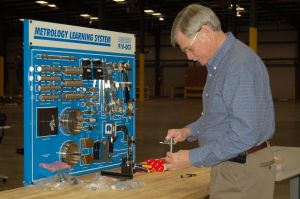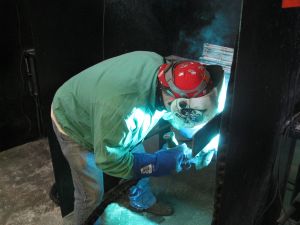Strength of Community Colleges and Vo-Tech Schools Vital to Employers
America’s educational institutions have been providing workforce training to community employers for so long, some companies have become all but dependent on educators to provide this service.

America’s educational institutions have been providing workforce training to community employers for so long, some companies have become all but dependent on educators to provide this service. In many cases, employers rely solely on state-sponsored institutions to screen, assess and train their workers free of charge—quite a good deal for the employer, but what’s in it for these states? Many believe a strong workforce development program is a business recruitment tool more powerful and effective than any other incentive.
 Machinists are trained on how to use precision measuring instruments at Forsyth Tech’s Caterpillar training facility.
Machinists are trained on how to use precision measuring instruments at Forsyth Tech’s Caterpillar training facility.
Forsyth Tech in Winston-Salem, N.C. is a primary example of a community college system founded for the sole purpose of providing a skilled workforce to businesses there. Dr. Gary Green is Forsyth Tech’s current president and believes his college has been a key variable in attracting new businesses to Winston-Salem. Companies like Caterpillar whose new 850,000 s.f. machining, assembly, testing and painting plant will need hundreds of skilled laborers to operate successfully.
“One of their primary reasons for choosing Winston-Salem was the strength of our computer-integrated machining program,” explained Dr. Green. “We have major resources in terms of well-equipped labs and shops to make sure that Caterpillar has the opportunity to train their startup workforce as they get people on and train them in machining. They’ll also have the ongoing pipeline for the long haul to make sure they have the skilled workforce they need going forward.”
Dr. Green says enrollment at Forsyth Tech is up 41 percent over the last four years, largely due to the country’s high unemployment rate. This influx of students means more will be applying to companies like Caterpillar upon graduation. More applicants is good, in theory, but too many can be taxing on an employer’s human resource department. ACT, one of the nation’s primary college admissions testing organizations, is offering to relieve some of this burden through its National Career Readiness Certificate (CRC), a national credential Forsyth Tech and many other community colleges have embraced and are administering to their students.
“The CRC certifies that students have basic academic skills—reading skills, applied math skills—and also gets into assessing soft skills—the ability to work in teams, to work with other individuals, etc.,” said Dr. Green.
Beyond the CRC, the National Association of Manufacturers’ Manufacturing Institute and the National Institute of Millworking Skills have their own certification programs and these credentials are transferable so any employer anywhere can know the skill level an individual has obtained. Dr. Green says these types of certifications are growing in acceptance and are being used more and more by employers across the nation.
“Nationally, across the board, community colleges are right at the crux of addressing the skills gap,” said Dr. Green. “And, it’s the community colleges that people are turning to for those skills and employers are turning to for the workforce they need.”
 The Maritime Training Center, Mobile, Ala.
The Maritime Training Center, Mobile, Ala.
Ed Castile, director of Alabama’s workforce resource AIDT, echoes this sentiment and says community and technical colleges are on a continuous quest to align workforce training programs with the rapidly changing needs of employers today, particularly in advanced manufacturing. AIDT acts as the primary training arm for Austal, USA, the world’s largest manufacturer of aluminum commercial and defense vessels, which is expanding for the fourth time since locating in Mobile in 2003.
“The technology used at Austal today is far more advanced than it was when they began five years ago.” said Castile. “As we recruit today, we know the technology is going to advance so we look for people who are trainable and comfortable within the ever-changing technological environment. It’s the only way to be successful.”
- Category:
- GrayWay
Some opinions expressed in this article may be those of a contributing author and not necessarily Gray.